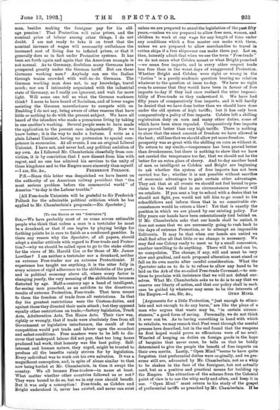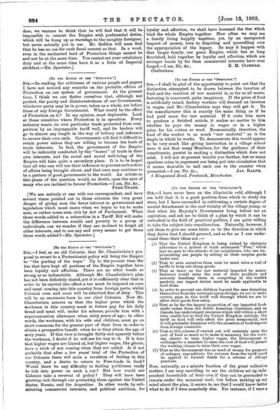[TO THE EDITOR OF THE " SPECTATOR.")
SIR,—We have probably most of us come across estimable people who think that unless a man is a teetotaler he must be a drunkard, or that if one begins by playing bridge for farthing points he is sure to finish as a confirmed gambler. Is there any reason why the Spectator, of all papers, should adopt a similar attitude with regard to Free-trade and Protec- tion ?—why we should be called upon to go to the stake either for the views of Mr. Harold Cox or for those of Mr. James Lowther ? I am neither a teetotaler nor a drunkard, neither an extreme Free-trader nor an extreme Protectionist. If experience has taught me anything, it is the utter folly in every science of rigid adherence to the shibboleths of the past ; and in political economy above all, where every factor is changing yearly, the very meaning of the shibboleths becomes distorted by age. Half-a-century ago a band of intelligent, far-seeing men preached, as an antidote to the disastrous results of extreme Protection, Free-trade. That term meant to them the freedom of trade from all restrictions. In that day the greatest restrictions were the Custom-duties, and against those they directed their main attack ; but they opposed equally other restrictions on trade,—factory legislation, Truck Acts, Adulteration Acts. Ten Hours Acts. Their view was, rightly or wrongly, that if trade were absolutely free from all Government or legislative interference, the result of free competition would put trade and labour upon the soundest and safest conditions. Free masters were to be left to dis- cover that underpaid labour did not pay, that too long hours produced bad work, that honesty was the best policy. Self- interest and human nature, they urged, might be trusted to produce all the benefits vainly striven for by legislation. Every individual was to work out his own salvation. It was a magnificent conception, and, in spite of abuse similar to that now being hurled at Mr. Chamberlain, in time it swept the country. We all became Free-traders--in name at least. What matter whether other countries followed us or not ? They were bound to do so, but we in any case should benefit. But it was only a conception ! Free-trade, as Cobden and Bright understood it, never has existed, and never can exist
unless we are prepared to annul the legislation of the past fifty years,—unless we are prepared to allow free men, women, and children to work at any wage for any length of time under any conditions which a free master can make with them, unless we are prepared to allow merchandise to travel in rotten ships if a free shipowner can make them pay. Let us, then, honestly admit that when we use the term " Free-trade " we do not mean what Cobden meant or what Bright preached —we mean free imports, and in every other respect trade less free than in the worst days of exaggerated Protection. Whether Bright and Cobden were right or wrong in the " forties " is a purely academic question bearing no relation whatever to the question at issue to-day. We have no right even to assume that they would have been in favour of free imports to-day if they had once realised the utter impossi- bility of Free-trade as they understood it. We have had fifty years of comparatively free imports, and it will hardly be denied that we have done better than we should have done under the old system of high tariffs ; but it has only been comparatively a policy of free imports. Cobden left a shilling registration duty on corn and many other duties, some of which have been since repealed. Comparatively free imports have proved better than very high tariffs. There is nothing to show that the exact amount of freedom we have allowed is the best ; still less that we should allow yet more freedom. Our prosperity was as great with the shilling on corn as without it. To return to my simile,—temperance has been proved better than drunkenness, but there is nothing to show that we have not carried the temperance too far, that we should not be the better for an extra glass of sherry. And to-day another band of men as intelligent as Cobden and Bright are beginning to ask whether the system of free imports has not been carried too far ; whether it is not possible without sacrifice of economic advantages to gain certain other advantages. They ask that at all events we should not feel bound to pro- claim to the world that in no circumstances whatever will we retaliate. If you sent a boy to school with a desire that he should not fight, you would not tell him to go round to his schoolfellows and inform them that in no conceivable cir- cumstances would he return a blow ! Yet that is exactly the position in which we are placed by our existing policy. For fifty years our hands have been ostentatiously tied behind us. If Mr. Chamberlain asks that our hands shall be untied, it does not mean that we are necessarily going to rush back to the days of extreme Protection, or• to attempt an impossible Zollverein. It may be that when our hands are untied we shall find after all that little or no change is necessary. We may find one Colony ready to meet us by a small concession, another unwilling to do anything. There will be, and can be, no compulsion. The change, if any, will and must be very slow and gradual, and each proposed alteration must stand or fall on its own merits after careful consideration. What the Spectator asks us to do is to refuse to allow any hand to be laid on the Ark of the so-called Free-trade Covenant,—to con- tinue to proclaim with insistence that we will not defend our- selves. What Mr. Chamberlain asks us to do is to say that we reserve our liberty of action, and that our policy shall in each case be guided by whatever may seem to be the interests of
[Arguments for a little Protection, "just enough to stimu- late and not enough to do any harm," are like the pleas of a man who argues that waste may be, "in certain circum- stances," a good form of saving. Personally, we do not think it ever can be. As to having something in hand with which to retaliate, we may remark that Peel went through the mental process here described, but in the end found that the weapons he first hoped would prove so efficacious were of no avail. Wearied of keeping on duties on foreign goods in the hope of bargains that never came, he tells us that he boldly determined to give the people the benefit of free imports on their own merits. Lastly, " Open Mind 'seems to have quite forgotten that preferential duties were originally, and we pre- sume still are, advocated by Mr. Chamberlain, not as a whip to be shaken in the face of the foreigner, but not actually used, but as a positive and practical means for building up the Empire. The attraction of the scheme from the Colonial point of view is to use the whip early and often, and keep it in use. " Open Mind" must return to his study of the gospel of preferential tariffs as preached by Mr. Chamberlain. If he
does, we venture to think that he will find that it will be impossible to cement the Empire with preferential duties, which will be hung up as warnings to the naughty foreigner, but never actually put in use. Mr. Seddon will soon find that he has no use for such fiscal cement as that. In a word, even in the enchanted land of Protection things cannot be and not be at the same time. You cannot eat your retaliatory duty and at the same time have it as a form of Imperial stickfast.—ED. Spectator.]











































 Previous page
Previous page